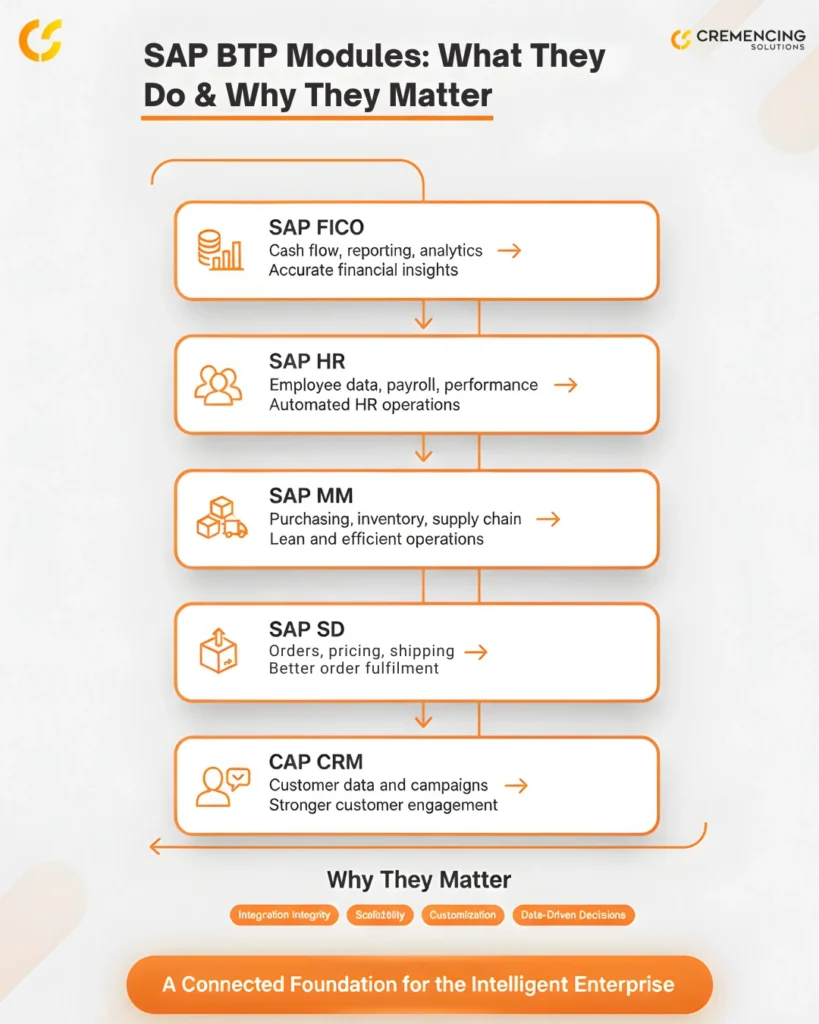Understanding SAP BTP Basis and Modules: What They Do and Why They Matter
Posted on November 16, 2025 by Laeeq Siddique

Introduction:
SAP Business Technology Platform (BTP) is a comprehensive set of integrated tools that aim at simplifying business operations, advancing scalability, and enabling data-driven insights. SAP BTP’s foundation acts as the brain that ensures the platform functions smoothly, as well as all of the different organs that are responsible for powering individual business activities. In today’s blog, we’ll demystify what is SAP BTP Basis and every single one of its modules, what they do, and why you should care if you want to build the next intelligent enterprise.
What is SAP BTP Basis?
SAP Basis is the underlying technology of SAP applications that allows different SAP modules to interface with each other, as well as allowing communication between an SAP system and external systems. “This crucial layer guarantees that SAP applications deploy, configure, and run efficiently. It handles tasks such as installation, configuration, and performance tuning.

Key Functions of SAP Basis:
- Administration: The team monitors and maintains SAP systems, ensuring the reliable operation of implemented services and troubleshooting with any problems occurring as well.
- Database Management: Manages the connection with the database and provides required intelligence to store, retrieve data according to application requirements including security, storage, and performance.
- User Management: Controls and authorizes user’s access in a secure, regulated manner to systems.
- Transport Management: The system transports changes correctly across various stages, such as from development to production.
What are SAP BTP Modules?
SAP BTP ecommerce modules represent the SAP system applications or parts of it responsible for some business-related part. These modules enable businesses to fit and mold their operations in a variety of industries. There’s a module for each aspect of business finance, HR, supply chain – and these can be glued all together in the quest of whole-business process pain.
Key SAP BTP Modules:
| Module | Key Functionality | Industry Benefits |
| SAP FICO (Finance and Controlling) | Responsible for cash flow, reporting and analysis | Accurate financial reporting and budgeting made possible |
| SAP HR (Human Resources) | Manages employee information, payroll, performance, and recruitment | Automates HR and enhances staff engagement |
| SAP MM (Materials Management) | Oversee purchasing, inventory and supply chain management | Helps the company to maintain as low an inventory as possible, lessens supplier relationships. |
| SAP SD (Sales and Distribution) | Oversees customer orders, pricing, and shipping | Higher customer satisfaction with better order fulfilment |
| SAP CRM (Customer Relationship Management) | Customer data, interaction, and campaign management | Enhances the customer experience and increases sales |
SAP Basis vs. SAP Modules:
SAP Basis provides the infrastructure that supports all SAP applications, and the modules that are used in SAP application systems are what’s called “functional modules,” which means it implements specific business-related transactions. Combined, they form a seamless offering which provides enterprises with immediate value through real-time data and insights.
Integration of SAP BTP Basis and Modules:
Whereas the SAP Basis takes care of the technical configuration and maintenance of the system, SAP modules provide the business processes that enable it to be running in an efficient manner. This is one easy way of understanding how they are related to each other. SAP Basis keeps your SAP system efficient and effective by keeping it running, supporting user requests, operating system compatibility, and database connectivity.
This framework is also used by SAP modules for the implementation of business processes. For instance, SAP FICO follows the flow of money to monitor financial transactions and SAP MM streamlines the supply chain processes.
Better Example SAP FICO and SAP MM Integration

For example, ordering a product in SAP SD could result in finance postings for invoicing in SAP FICO and update the stock levels with SAP MM. And all of this is because of the reliable foundation set down by SAP Basis.
The Importance of SAP BTP Basis and Modules
SAP BTP Basis and its modules are the products to use if you want to create a connected intelligent enterprise. Here’s why they matter:
- Integration Integrity: SAP Basis ties together your layers, so modules can operate effortlessly.
- Customizability: With SAP modules, you can customize the solution to meet industry and functional requirements in a flexible way.
- Scalability: SAP BTP enables companies to effortlessly scale their SAP landscape as business expands.
- Efficiency: It helps to automate your business processes and other operations through SAP modules that result in better management of resources.
Advantages of SAP BTP Modules and Basis
| Benefit | Description |
| Improved Operational Efficiency | Optimize back office functions through real-time cross-departmental data integration |
| Customization | Customize SAP solutions in line with sector-specific requirements and business objectives |
| Data-Driven Decision-Making | Leverage information across multiple SAP modules to make better decisions in the moment. |
| Enhanced Scalability | SAP’s modular design also means that as businesses grow, they can add desired functionality as required. |
FAQs
Q1: What is SAP Basis and how it differs from SAP Modules?
SAP Basis is the bottom level code that creates the foundation for an SAP system, it’s upon which all additional components are built (much like how you would add bits to build on an operating system). SAP modules, however, offer specific business features or functions (finance, HR, supply chain) that only run on this base.
Q2: Can the SAP modules be customized by companies?
Well, yes, the SAP modules can be very customized. Each module is at…
Q3: Brief about SAP Basis and module in the company systems?
The technical infrastructure through which the SAP modules operate is provided by the Basis component. For instance, financial operations are managed by SAP FICO but cannot run properly without the database and system management from SAP Basis.
Q4: Which enterprises benefit from SAP modules?
SAP modules are useful for almost all enterprises and businesses. Examples include:
- Production: SAP MM and SAP PP
- Retail: SAP SD and SAP CRM
- Healthcare: SAP IS-H (Hospital)
- Financials: SAP FICO and SAP TR (Treasury)
Q5: Is the SAP BTP suitable for growing companies?
Yes, it’s meant to scale, SAP BTP. Businesses have the flexibility to begin with a few core modules and scale out as needed, adding on new modules or increasing capacity in their SAP environment.
Conclusion
So, what’s the difference between them? The SAP BTP Basis and the modules are building blocks that enable companies to create an interconnected, intelligent enterprise. By knowing the purpose of each piece and how they all fit together, businesses can maximize what SAP BTP has to offer in order to fuel growth, increase productivity, and keep ahead of the curve.
For more insight on SAP BTP read our Blog.
Regardless of whether you want to fine-tune your financials in SAP FICO or optimize logistics with SAP MM, Cremencing Solution can walk you through the process and make sure your SAP system is deployed just the way your business intends it to be.
Resources
To learn more about what SAP BTP Basis and its modules can do for your business, check out these resources:
